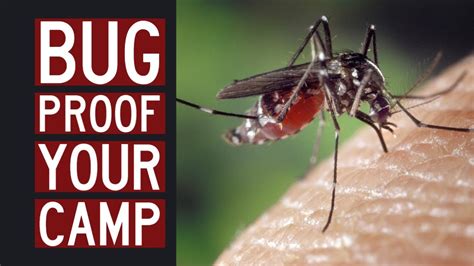Mosquito-Proofing Your Camp: Top Tips for a Pest-Free Outdoor Adventure
Camping under the stars is a magical experience, but the incessant buzzing of mosquitoes can quickly turn paradise into a torment. Nobody wants to spend their vacation swatting at biting insects. Fortunately, with a bit of planning and preparation, you can significantly reduce your exposure to these pesky pests and enjoy a peaceful, itch-free camping trip. This guide provides top tips for mosquito-proofing your camp, ensuring a comfortable and enjoyable outdoor experience.
What Attracts Mosquitoes to Your Campsite?
Before we dive into prevention strategies, understanding what draws mosquitoes to your campsite is crucial. These blood-sucking insects are attracted to several factors, including:
- Carbon Dioxide: Mosquitoes are drawn to the carbon dioxide we exhale.
- Body Heat: They can sense your body heat from a distance.
- Sweat: The lactic acid and other chemicals in sweat are attractive to mosquitoes.
- Dark Clothing: Dark colors tend to absorb more heat, making you a more appealing target.
- Standing Water: Mosquitoes breed in stagnant water, so any puddles or containers holding water near your campsite will attract them.
Choosing the Right Campsite Location
The location of your campsite plays a significant role in minimizing mosquito encounters. Here's what to consider:
- Elevation: Mosquitoes generally prefer lower altitudes. Choosing a higher-altitude campsite can significantly reduce the number of mosquitoes you encounter.
- Windy Areas: Wind disperses mosquitoes, making it harder for them to find you. Look for campsites in areas with good airflow.
- Avoid Standing Water: Scout your campsite carefully, avoiding areas with stagnant water like ponds, marshes, or even puddles.
Mosquito-Repelling Gear and Techniques
Equipping yourself with the right gear is vital for effective mosquito protection.
Repellents:
- DEET: DEET is a highly effective repellent, available in various concentrations. Choose a concentration appropriate for your needs and follow the instructions carefully.
- Picaridin: A slightly less potent but still effective alternative to DEET, picaridin is a good choice for those sensitive to DEET.
- IR3535: Another effective repellent, IR3535 is often considered gentler on the skin than DEET.
- Oil of Lemon Eucalyptus (OLE): A plant-based repellent, OLE is effective but may not last as long as synthetic repellents.
Remember to always apply repellent according to the manufacturer's instructions.
Clothing:
- Light-Colored Clothing: Wear light-colored clothing to reflect heat and make yourself less attractive to mosquitoes.
- Long Sleeves and Pants: Cover exposed skin as much as possible, especially during dawn and dusk when mosquitoes are most active.
- Mesh Clothing: Consider wearing clothing with built-in mosquito netting for extra protection.
Other Protective Measures:
- Mosquito Nets: Use mosquito netting over your sleeping area to create a barrier against biting insects.
- Fans: Mosquitoes are weaker fliers and can be deterred by a gentle breeze created by a fan.
- Incense or Mosquito Coils: These can provide some level of protection, but their effectiveness is limited and they should be used with caution.
Keeping Your Campsite Clean and Dry
Maintaining a clean and dry campsite significantly reduces mosquito breeding grounds and attraction.
- Dispose of Trash Properly: Make sure to dispose of all trash in designated receptacles to prevent attracting other insects that may attract mosquitoes.
- Empty Standing Water: Regularly check for and empty any containers holding standing water, such as water bottles, food cans, or even footprints in puddles.
- Cover Food: Store food in sealed containers to prevent attracting insects.
What about Natural Mosquito Repellents?
<h3>Are natural mosquito repellents effective?</h3>
Natural repellents, such as citronella candles and essential oils (like lavender or eucalyptus), offer some level of protection, but their effectiveness is often less consistent than synthetic repellents like DEET or Picaridin. They can be a good supplement to other mosquito control measures, but shouldn't be relied upon as your sole method of protection, especially in areas with high mosquito populations.
<h3>What are some effective home remedies for mosquito bites?</h3>
Several home remedies can help alleviate the itching and discomfort of mosquito bites. These include applying a cold compress, using calamine lotion, or applying a paste of baking soda and water. However, if you experience an allergic reaction or severe symptoms, seek medical attention immediately.
Planning Your Trip
<h3>How can I plan my camping trip to minimize mosquito exposure?</h3>
Planning your trip strategically is key to minimizing mosquito exposure. Research the area you'll be camping in to understand the typical mosquito activity levels for that time of year. Consider camping during cooler months or times of day when mosquitoes are less active. Pack accordingly, bringing effective repellents, protective clothing, and mosquito nets. Thoroughly inspect your campsite for standing water before setting up camp.
By following these tips, you can significantly reduce your exposure to mosquitoes and enjoy a more comfortable and memorable camping experience. Remember, prevention is key! With careful planning and preparation, you can leave the mosquito bites behind and focus on the wonders of the great outdoors.

